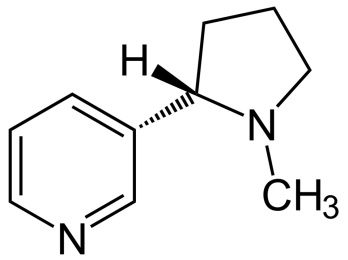
(*NOTE: The challenge remains, the donation part has expired)
Everything else below is intact:
Foreword:
For decades, Public Health, Tobacco Control, and Government experts have agreed in unison, that nicotine is the addictive chemical in cigarettes with comparisons and statements that nicotine is as or more addictive than heroin.
This “Public Health Challenge” is to show scientific proof that the assertions of addiction are true.
I have decided to put (our) money where your assertions are by taking you, the health, tobacco control, science, and research communities, to literal task on nicotine addiction.
This is a 30-day challenge for anyone in public health to show nicotine addiction in humans, without MAOI’S, ammonia, or any other non-nicotine additive or any form of tobacco, without question.
You don’t need to prove me wrong, you need to prove yourselves right.
That’s it.
Nicotine Addiction
An Open 30-Day Public Health Challenge:
Addiction to a habit-forming substance is defined by Merriam-Webster:
Medical Definition of addiction
-
: compulsive physiological need for and use of a habit-forming substance (as heroin, nicotine, or alcohol) characterized by tolerance and by well-defined physiological symptoms upon withdrawal; broadly: persistent compulsive use of a substance known by the user to be physically, psychologically, or socially harmful [emphasis added.]
Criteria:
To show proof of nicotine addiction with existing clinical trials, case studies, data, and scientific documentation of addiction to nicotine alone, without any form of tobacco or Monoamine oxidase inhibitors (MAOI’S), ammonia, or any other non-nicotine additive, in humans.
Documentation submitted (either as a text file or in the form of a web link) must be accessible and not be behind a “paywall”.
Documentation:
Unacceptable documentation:
- Animal studies (rats, mice, monkeys, etc.) are not acceptable.
- Submissions not published in professional or scientific journals or government websites are not acceptable.
- Anything inaccessible by the public, including “paywalls” via the internet, are not acceptable.
- Oral presentations, press releases are not acceptable.
- Existing clinical trials, case studies, data, in vitro studies, self-reported surveys and scientific documentation in humans that claim probabilities or hypothetical possibilities as they do not show nicotine “is” addictive and are not acceptable.
- Existing clinical trials, case studies, data, in vitro studies, self-reported surveys, and scientific documentation cannot include words and phrases like “hand to mouth, dependent, habitual, ritualistic” or words like “can, conceivably, could, likely, may, might, perhaps, possible, possibly, possibility, probably, probability” and cannot include tobacco or MAOI’s, ammonia, or any other non-nicotine additive for this challenge.
Acceptable Documentation:
- Documentation must be accessible to the public.
- Documentation must show the acceptable definition of addiction in existing clinical trials, case studies, data, or science and include characteristics of addiction such as increased tolerance, and withdrawal symptoms of nicotine alone, in humans, without any form of tobacco or MAOI’s, ammonia, or any other non-nicotine additive.
- Documentation showing addiction in clinical trials or case studies with 3% or 2 subjects, whichever is greater.
- Documentation must include a clear description of methodologies and results.
- Peer-reviewed submissions must include names and affiliations of reviewers.
Documentation submitted (either as a text file or in the form of a web link) must be accessible and not be behind a “paywall”.
Documentation submitted must also include proof of existence with at least three of the following compulsive use or behaviors identified and defined, such as:
- Physical addiction
- Loss of job
- Erratic or deviant behavior
- Decreased social activities
- Increased tolerance of nicotine and use over time
- Harm to the patient or others around them
- Withdrawal symptoms, phases
Submission:
Documentation must be submitted to this blog publicly and directly in the comment section below.
*Reward:

*This section is no longer valid but left intact.
*If addiction to nicotine is proven according to the criteria above, 5% of the funds donated during this 30-day challenge (minus processing fees) will be donated to The Campaign for Tobacco-Free Kids.
*The remaining 95% (if proven) will be donated as follows:
*In the absence of or lack of documentation submitted per the criteria stated above, or if this Public Health Challenge is deemed uncontested, any and all funds donated during this 30-day challenge (minus processing fees) will go to ecigarette-research.org for further research by Dr. Farsalinos and his colleagues.
*This section is no longer valid but left intact.
*To donate any amount, please go here to the GoFundMe page:
*Nicotine Addiction: An Open 30-Day Public Health Challenge
*If you cannot donate with GoFundMe (due to bank fees, country of origin or other reasons), please message me. I can accept your donation of any amount securely via PayPal (link removed) and I will then transfer it with your name or initials (please specify) so there is a receipt for both of us.
(Final note, the challenge raised net total of $560.06 for ecigarette-research.org.)


Hate to potentially make money for the Campaign for Tobacco Free Kids, but since you asked. Here’s a publicly accessible, peer-reviewed study demonstrating addiction to nicotine gum in never smokers – https://www.ncbi.nlm.nih.gov/pmc/articles/PMC1939993/
Talking about the signs of dependence and withdrawal:
“Never-smokers reported classical criteria of dependence, such as a compulsion to use the gum, use in higher dosage and for a longer duration than initially intended, withdrawal symptoms, unsuccessful attempts to stop and gum use despite its high cost [16,17]. Their open-ended answers also reflected classical criteria of dependence, such as failed quit attempts followed by urges to use the gum, relief of withdrawal symptoms (e.g. difficulty concentrating) by gum use, and withdrawal symptoms (e.g. urges to use the gum after a few hours).”
And the conclusion:
“This is to our knowledge the first report of addiction to nicotine gum in never users of tobacco. However, this phenomenon is rare, and although the long-term effect of nicotine gum is unknown, this product is significantly less harmful than tobacco.”
Not sure if it meets three of the last group of criteria you requested, but I think it does, specifically these ones:
Physical addiction
Increased tolerance of nicotine and use over time
Harm to the patient or others around them (*This is only really financial cost in the study, but still)
Withdrawal symptoms, phases
Regardless, give the study a read and honestly think about whether it shows that nicotine can be addictive to never-smokers. Forget the criteria – where I think you’ve set the bar quite high so it’s very difficult to actually win the challenge (e.g. would you really expect someone to lose a job over clean nicotine use, or even smoking for that matter?) – just read it and see what you think.
I wish nicotine wasn’t addictive at all so we’d have a stronger (albeit eerily Big Tobacco-ish) argument to use in favor of vaping, but that doesn’t seem to be true.
(tried to post this before so sorry if it duplicates!)
LikeLiked by 1 person
From what I was reading about invention of Nicorette, in his first trials Fernö just made nicotined gum and it was complete fail to help smokers to quit. So, he put an additive, from potassium, to potentialize nicotine and after he has some results. So, nicotined gum are not just nicotined gum, it contain pharmacological effect additive(s ?).
For me, it’s not clear if vaping liquid have or not some constituents which could play a similar role…?
LikeLiked by 2 people
https://www.ncbi.nlm.nih.gov/pmc/articles/PMC1939993/
That isn’t a study. It’s an “Internet questionaire”. Not scientific by any stretch of the imagination.
LikeLiked by 1 person
How else do you propose they work out if people are addicted? Follow them around taking complex biochemical readings 24 hours a day? What kind of evidence do you expect?
To determine whether someone is addicted to nicotine, researchers use the Fagerstrom test or something similar. That is literally the most scientific way we know how to test for it, and that’s what the study did. It used *two* different questionnaires, modified so they could be used for nicotine gum rather than cigarettes.
If the questionnaire is scientifically devised and analysed, an internet questionnaire can be scientific.
LikeLiked by 2 people
Internet questionnaires are not very good for science because you don’t see and talk to the people in person. I have a problem with many vaping surveys because they ask if your health is better or worse with no room to explain. I have IBD that was probably being treated by smoking, it started to get worse which got me to quit, then it really got bad. As Crohn’s is often made worse by smoking and nicotine is assumed to be the same as smoking I quickly went to 0mg. When it looked like Ulcerative Colitis I got permission to try nicotine and I increased the amount of nicotine over the 11mg it took for me to quit.
So my answers of my health has got much worse and I increased nicotine from 11mg-0mg-18mg would suggest vaping is unhealthy (rather than smoking is healthy) and addiction. Yet the truth is my health got worse because smoking was acting like medicine and the nicotine increase wasn’t because of addiction it was to add more of one part of the medicine to make up for the lack of another unknown part in smoke. An in person questioner can make a judgement call. Like epidemiology internet surveys can point you in a direction but they need better confirmation. Otherwise the surveys here would be accepted as science.
My non-addiction to nicotine is backed up by once confirmed as Crohn’s and going to immune suppression I went from 18mg to 4mg in a week with no problems, I really didn’t like 18mg. Once my nicotine liquids were used up I went to 0mg again without problems other than I noticed I wasn’t doing as good to the next infusion.
LikeLiked by 1 person
Myk203 – you’re absolutely right about surveys that aim to work out the health effects of something, which, as you say, include the “my health is better since switching” vaping surveys. There are a lot of variables, potentially biased memories and people aren’t exactly reliable sources of information about things like that (e.g. I don’t really *know* how my health has changed since I started vaping, since I’ve barely been to the doctor).
But addiction doesn’t require clinical readings to be taken in the same way. e.g. one question they always use is “how long after waking do you use nicotine?” – the only way to find out about that is to either follow them around all day or just ask them. I strongly doubt that people’s responses to questions like that are unreliable – it’s not like asking someone to estimate their lung capacity.
The same goes for the other items on the Fagerstrom test – https://cde.drugabuse.gov/sites/nida_cde/files/FagerstromTest_2014Mar24.pdf
“Do you find it difficult to refrain from smoking in places where it is forbidden?”
“Which cigarette would you most hate to give up? First in the morning or other?”
“How many cigarettes do you smoke each day?”
“Do you smoke more during the first hours after waking than the rest of the day?”
“Do you smoke when you are so ill that you’re in bed most of the day?”
ALL of these can clearly be answered by the individual with no real reason to expect inaccuracy. I’m not saying the Fagerstrom test is the best one or anything like that, but this is the sort of thing they all ask.
But if you think this approach is unreliable, what do you suggest? How would we work out if someone is addicted to nicotine?
LikeLiked by 1 person
I don’t think the questions are (totally) unreliable but the internet is. That’s besides no ability to clarify. Same questions, same results in person would be more believable.
LikeLike
OK, so the only thing that would have to be different would be the questionnaire would be conducted in person? Then you’d accept that results like the ones obtained in the survey show that nicotine is addictive?
I find this uncontroversial, to be honest. We all agree that MAOIs and some additives make nicotine *more* addictive, yet most vapers still use nicotine without them, because we’re addicted to (or dependent on) it. Is it really that big a leap to say that while nicotine alone isn’t super-addictive, it is still somewhat addictive?
LikeLike
This was submitted on Twitter:
Article:
Nicotine and the adolescent brain:
https://www.ncbi.nlm.nih.gov/pmc/articles/PMC4560573/
They argue it “may” – “using rodent models”…. thank you for that, though – I had not seen it !
LikeLike
Clive Bates added this via Twitter:
https://www.ncbi.nlm.nih.gov/pubmed/28389330
LikeLike
This person – https://twitter.com/OkieAllergy/status/854900677629399040
Submitted these on Twitter:
http://www.nejm.org/doi/full/10.1056/nejmra0809890
http://www.amjmed.com/article/S0002-9343(08)00103-4/abstract
https://www.ncbi.nlm.nih.gov/m/pubmed/28190083/?i=2&from=nicotine%20addiction%20mechanism
https://www.ncbi.nlm.nih.gov/pubmed/28389330
https://www.ncbi.nlm.nih.gov/m/pubmed/26322330/?i=37&from=nicotine%20addiction%20mechanism
LikeLike
I asked via email for critique or opinion of this challenge before it was over, and this was the response:
I would add in a requirement that the trial must be of never-smokers. A population of current or former smokers is a very different one from never-smokers in general, as they have a pre-existing addiction to tap into and are already weakened.
Requiring 3% of subjects to be addicted sounds unfair to me, since many trials will be short term while we are concerned with long-term use, not brief flings and then never again. If a trial lasts a month and, say, 2% of subjects get addicted, then that implies that after 10 years, as much as 91% of subjects might be addicted (1 – 0.98^(12*10)). If there was a 90%+ chance that long-term use would lead to addiction, then this would fail your criterion yet I would find it *highly* concerning! Similarly if the trial is 1 week or 1 day etc.
> Peer-reviewed submissions must include names and affiliations of reviewers.
Are you kidding? How many papers do you see listing the anonymous peer reviewers? Damned few. It’s a rare journal indeed which makes public that sort of information. Such a requirement would exclude something like 99% of all research publications ever.
The prize you offered is also meaningless. An unspecified sum to a charity I’ve never heard of. If I had on hand a stack of studies, I wouldn’t bother leaving a comment for a prize like that.
—
gwern
https://www.gwern.net
LikeLike